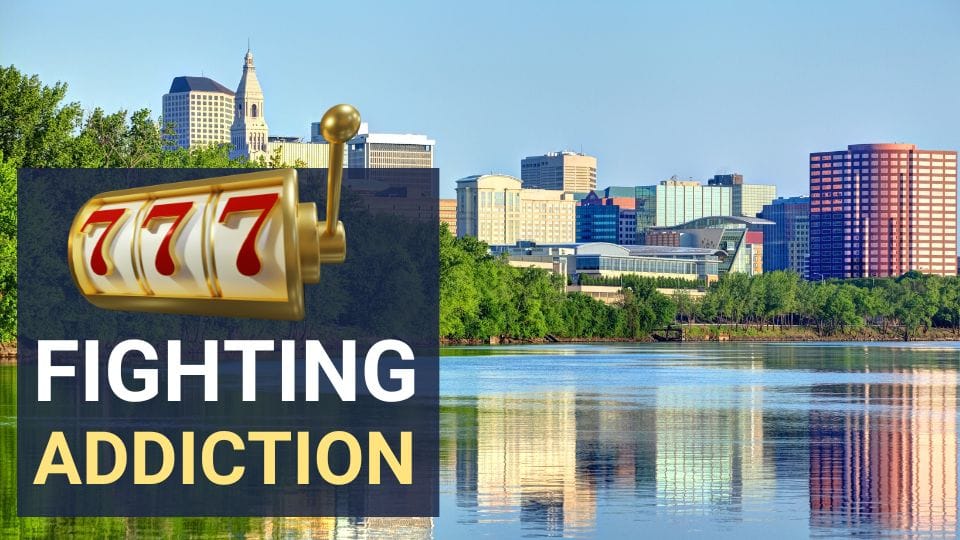Super Summary
The Connecticut Council on Problem Gambling advocates for prevention, treatment, and recovery for those affected by gambling problems. The council offers a helpline, support options like Gamblers Anonymous, and Better Choice Treatment Programs. Kaitlin Brown, a licensed professional counselor, discusses the state’s ongoing efforts to tackle problem gambling, including initiatives like Disorder Gambling Integration Treatment (DIGIT), the role of peer counselors, and collaboration with responsible gambling committees to ensure people struggling with gambling addiction can access the help they need.
Main topics discussed:
- Connecticut Council on Problem Gambling’s role in advocating for prevention, treatment, and recovery
- The current state of legalized gambling in Connecticut
- Initiatives and programs to address problem gambling, such as DIGIT
- The importance of peer counselors and licensed therapists in problem gambling recovery
- Collaboration between responsible gambling committees, casinos, and treatment providers
The Role of the Connecticut Council on Problem Gambling
The Connecticut Council on Problem Gambling is a nonprofit organization that advocates for prevention, treatment, and recovery for those experiencing gambling problems or affected by someone else’s gambling. They offer a 24-hour crisis helpline at 800.522. 4700, available by phone and text. The council is gambling neutral, focusing on advocating for informed expansion and ensuring funds are allocated for prevention, treatment, and recovery within Connecticut.
Kaitlin discusses the current state of legalized gambling in Connecticut, including the two existing tribal casinos, Mohegan Sun and Foxwoods. Ongoing legislative bills propose legalizing sports gambling, adding new casinos, and implementing a lottery system that allows for the purchase of lottery products through technology.
If someone with a gambling problem contacts the council’s helpline, they are connected with a licensed therapist or counselor. The council offers support options, including Gamblers Anonymous meetings and Better Choice Treatment Programs. In Connecticut, these programs are free for the uninsured or underinsured.
Kaitlin Brown explains that her journey into gambling addiction was a bit unconventional. She began working with people experiencing gambling problems in an inpatient program and went on to work in outpatient programs as well. She emphasizes the importance of advocating in the problem gambling field, which tends to be small and underrepresented.
Gambling Addiction Treatment Options in Connecticut
During the interview, Kaitlin also talked about her involvement with the Women’s Services Practice Improvement Collaborative, an organization in Connecticut focused on women’s programs. Kaitlin ensures that problem gambling is considered and addressed in these programs by attending meetings and sharing information about related events and advocacy efforts.
Connecticut’s Efforts to Address Problem Gambling: Advocacy, Treatment, and Recovery
Kaitlin shared that the Connecticut Council on Problem Gambling focuses on advocacy, treatment, and recovery and works closely with the Better Choice Network. This network of treatment providers is well aware of the co-occurring nature of gambling, substance abuse, and mental health disorders. Kaitlin’s role involves providing training and webinars to various professionals in the field, raising awareness about the importance of screening for problem gambling, and asking the right questions.
One of the critical initiatives in Connecticut is Disorder Gambling Integration Treatment (DIGIT), which trains mental health and substance use providers on how to ask appropriate questions about gambling. Kaitlin highlighted the importance of offering services to help providers feel more confident in addressing gambling issues with their clients.
The Importance of Peer Counselors in Problem Gambling Recovery
In Connecticut, there is a growing network of counselors and peer counselors working in the field of problem gambling. Peer counselors are individuals with lived experience of gambling addiction who can support and guide others struggling with the issue. They often facilitate groups, provide individual counseling, and offer family counseling. Meanwhile, counselors are licensed professionals trained in evidence-based practices and hold social work, psychology, and counseling degrees.
The Better Choice Program in Connecticut employs peer counselors with problem gambling experience, allowing clients to choose between traditional therapists and peers for support. Kaitlin noted that one of the benefits of having both therapists and peer counselors involved in the process is the collaborative approach to treatment planning, ensuring that everyone involved stays on the same page.
In addition, to support problem gamblers, the Better Choice Treatment Programs also offer help to family members and friends affected by a loved one’s gambling. These “persons affected” can access treatment programs at no cost, emphasizing the importance of a comprehensive approach to addressing problem gambling in Connecticut.
Kaitlin’s interview highlighted the ongoing efforts in Connecticut to tackle problem gambling through advocacy, treatment, and recovery. As the state continues to expand its network of trained professionals and peer counselors, individuals and families impacted by gambling addiction will have increased access to the support and resources they need.
Supporting Loved Ones Affected by Gambling Addiction
Kaitlin explained that during the first appointment with a client, the main objective is to gather information, make connections, and allow the person to share their story. The counselor and client work together to develop a treatment plan tailored to the individual’s goals and needs.
Harm reduction is a topic that often comes up in gambling treatment. While some clients, like Brian, identify as “all or nothing” gamblers and can’t fathom limiting their gambling, others have successfully reduced the frequency or amount they gamble. Kaitlin explained that harm reduction can be an excellent technique to meet people where they are, and it may eventually lead some clients to abstinence.
Jeff agreed with this sentiment, stating that harm reduction is most effective in responsible gambling, not treating gambling disorder. He suggested that for some clients, harm reduction might be a stepping stone toward accepting that they need to stop gambling completely.
When asked about clients’ most common gambling problems, Kaitlin revealed that lottery and casino slot machines top the list. She also noted that the legalization of sports gambling in some states has led to a spike in helpline calls related to this type of gambling. The presence of helpline numbers on lottery tickets and casino player cards helps to connect problem gamblers with the assistance they need.
In Connecticut, responsible gambling committees work closely with casinos to increase their responsible gambling messaging. The helpline number is prominently displayed in various locations to ensure that people in need can easily find it. The number is also printed on the back of Connecticut lottery tickets. Online searches have become another common way for people to find help, with many directly calling therapists on the Better Choice treatment program website.
In summary, gambling counselors are vital in helping problem gamblers address their issues and find the most suitable treatment plans. Harm reduction is a useful tool sometimes, but its effectiveness varies depending on the individual. The collaboration between responsible gambling committees, casinos, and treatment providers ensures that those struggling with gambling addiction can access the help they need.
Focus on Prevention, Advocacy, and Responsible Gambling
The Connecticut Council on Problem Gambling dedicates most of its resources to prevention and advocacy efforts. These include outreach events, presentations in middle schools, health fairs, and training, according to Kaitlin, a representative from the council. The organization is also involved in responsible gambling initiatives through the Connecticut Partnership, a collaboration with the Department of Mental Health and Addiction Services, Problem Gambling Services, and the Connecticut Lottery.
Both of the state’s casinos have responsible gambling committees, which council members attend. They work to increase responsible gambling messaging to ensure that it reaches everyone, regardless of whether they have a gambling problem. Kaitlin highlights the distinction between responsible gambling (RG) and problem gambling (PG), noting that efforts that focus on the latter, such as helplines, don’t necessarily promote responsible gambling.
The council is also working on marketing campaigns targeting responsible gambling messaging in partnership with the casinos. Their presence in the casinos includes training videos for employees, resource tables during Problem Gambling Awareness Month, and participation in Responsible Gaming Education Week. These efforts are important because research shows that casino employees are at an increased risk of developing gambling problems.
Kaitlin emphasizes that gambling should be viewed as entertainment and socialization and that casinos don’t want problem gamblers. By having the council present in the casinos, they can ensure that individuals struggling with gambling issues know there are resources available for help.
The council offers helpline calls and chat and text options for individuals seeking assistance. Interestingly, chat and text numbers have been lower than anticipated, with most callers in their forties and fifties. However, the demographics for chat and text users are generally younger, and the council is working to promote these alternative means of communication.
With the increasing availability of gambling opportunities, organizations like the Connecticut Council on Problem Gambling must continue focusing on prevention, advocacy, and responsible gambling initiatives. This will ensure that individuals can make informed decisions about their play and seek help when necessary.
While many still struggle to see gambling as a real addiction, organizations are working tirelessly to address this issue and provide help.
Brian discussed his skepticism towards the gambling industry’s concern for problem gamblers, but Kaitlin reassured him that casinos are implementing more in-depth employee training. All staff members, not just dealers, need some education about gambling problems. The industry primarily provides funding for problem gambling treatment, as no federal funding is available.
One of the biggest obstacles in addressing problem gambling is the lack of understanding and recognition that gambling is a genuine addiction. It is particularly evident in the legal system, where gambling-related crimes are not treated with the same support as substance use-related offenses. Kaitlin and Jeff advocate for increased awareness and training for judges, probation officers, and others in the criminal justice system.
A key issue is the lack of appropriate screening for gambling problems. Many professionals in the mental health and substance use fields do not know how to properly screen for gambling issues, leading to underdiagnosis and a lack of support. Educating these professionals and ensuring they use effective screening methods can identify more problem gamblers and refer them to appropriate treatment programs.
Conclusion
Connecticut actively addresses problem gambling through a comprehensive approach that includes prevention, treatment, and recovery initiatives. By offering support options like helplines, counseling, and treatment programs and collaborating with responsible gambling committees, the state ensures that those struggling with gambling addiction can access necessary resources. As awareness and understanding of problem gambling continue to grow, the stigma surrounding this issue can be broken, enabling more individuals and families to seek help and support in their journey toward recovery.
 English
English Español
Español Français
Français Português
Português Svenska
Svenska

